How Your Morning and Nighttime Routines Affect Your Health
After you read up on the consequences, both good and bad, of your habits, it may be time for a tweak or two.
By Emma Haak
Mood Lighting
What you do: Dim the lights 30 minutes before bed—and not just the blue one coming from your electronic devices
Why that's good: Any kind of light can suppress the secretion of melatonin, the calming hormone that brings on sleep. "The color or wavelength doesn't matter as much as people think it does," Morgenthaler says. Exposure to normal room light in the 8 hours before bedtime delayed the onset of melatonin secretion by more than an hour and a half compared with explosure to dim lighting, according to a study in the Journal of Clinical Endocrinology and Metabolism.
One more thing: You don't have to sit in darkness after the half-hour-till-bed mark. Light that's just bright enough to read by shouldn't compromise your sleep, says Morgenthaler.
Why that's good: Any kind of light can suppress the secretion of melatonin, the calming hormone that brings on sleep. "The color or wavelength doesn't matter as much as people think it does," Morgenthaler says. Exposure to normal room light in the 8 hours before bedtime delayed the onset of melatonin secretion by more than an hour and a half compared with explosure to dim lighting, according to a study in the Journal of Clinical Endocrinology and Metabolism.
One more thing: You don't have to sit in darkness after the half-hour-till-bed mark. Light that's just bright enough to read by shouldn't compromise your sleep, says Morgenthaler.
Published 05/26/2015
As a reminder, always consult your doctor for medical advice and treatment before starting any program.


